Gautrain Management Agency Amendment Bill G001-2017 Overview
The Gauteng Provincial Legislature's Portfolio Committee deliberates the Gautrain Management Agency Amendment Bill G001-2017, seeking to expand the agency's mandate for new rail projects. The proposed amendments include extending the Agency's powers to cover new transport projects, delegation of functions, and liability limitations.
Download Presentation

Please find below an Image/Link to download the presentation.
The content on the website is provided AS IS for your information and personal use only. It may not be sold, licensed, or shared on other websites without obtaining consent from the author.If you encounter any issues during the download, it is possible that the publisher has removed the file from their server.
You are allowed to download the files provided on this website for personal or commercial use, subject to the condition that they are used lawfully. All files are the property of their respective owners.
The content on the website is provided AS IS for your information and personal use only. It may not be sold, licensed, or shared on other websites without obtaining consent from the author.
E N D
Presentation Transcript
GAUTRAIN MANAGEMENT AGENCY AMENDMENT BILL [G001-2017] GAUTENG PROVINCIAL LEGISLATURE: ROADS AND TRANSPORT PORTFOLIO COMMITTEE
INTRODUCTION The Gauteng Provincial Legislature s Portfolio Committee ( Committee ) is currently seized with the Gautrain Management Agency Amendment Bill G001-2017 ( the Bill ). In view of its constitutional obligations to facilitate meaningful engagement with all relevant stakeholders in processing this Bill, the Committee hereby shares its preliminary views on the Bill. These views have taken into account written submissions the Committee has received from stakeholders thus far. Having regard to the importance of the Bill and the Committee s commitments to fulfilling its constitutional obligations relating to public participation; the Committee hereby calls for further submissions from all relevant stakeholders on the Bill in general as well as the on the Committee s proposed amendments to the Bill. [KINDLY NOTE THAT THE COMMITTEE S PROPOSED AMENDMENTS TO THE PROPOSED DELTIONS HAVE BEEN HIGHLIGHTED IN PINK.] BILL HAVE BEEN HIGHLIGHTED IN RED AND
Gautrain Management Agency Act On 3 September 2007, the Gautrain Management Agency Act came into operation and its purpose was to provide for the establishment of the Gautrain Management Agency as a provincial entity to manage and oversee the concession agreements for the Gautrain Rapid Rail Link Project. The Gautrain Rapid Rail Link Project was the original project which provided the link from Hatfield in Tshwane to Park Station in Johannesburg and from Sandton to OR Tambo Station in Ekurhuleni. This was regarded as Phase One of the project. In terms of section 1 of the Gautrain Management Act Project is currently defined to mean The Gautrain Rapid Rail Link Project for the design, construction, financing, operation, and maintenance of the rapid rail transit system, feeder and distribution service to developed and operated pursuant to a concession agreement. Thus, the Project was limited to Phase One.
CONTINUED. . . The Gauteng Province now seeks to expand its rapid rail network to new areas and will therefore embark on new projects or an extension of Phase One project. The limited scope of the Gautrain Management Agency Act has provided the impetus for the proposed Amendment Act, so as to enable the envisaged expansion. According to the Explanatory Memorandum the powers of the Agency will be extended to cover possible extensions as well as new or similar projects, including broader public transport and rail related projects that fall within functional areas of the province s powers under Part A of Schedule 4 to the Constitution .
THE AMENDMENT BILL The MEC s powers to delegate certain public transport and rail related functions under the Gauteng Transport Infrastructure Act, 2001 to the Agency are also sought to be extended. By broadening the mandate of the Agency, to include public transport functions and powers it is hoped that the Agency may then also be able to facilitate the establishment of the Transport Authority In terms of its long title, the Bill seeks to amend the Principal Act by inter alia substituting certain definitions, amending the objects of the Agency, extending the scope of projects that the Agency may undertake, amending the functions of the Agency; to provide for the limitation of liability, and to provide for consequential amendments.
CLAUSE 1(B) Clause 1(b) defines concession agreement to mean: a written agreement concluded between the Province and a concessionaire for any aspect of the planning, design, construction, operation, maintenance, financing or partial financing of [the Gautrain Rapid Rail Link Project] a project. Reference to the Gautrain Rapid Rail Link Project has been removed and replaced with the words a project and further, the words maintenance and planning have been inserted.
CLAUSE 1(f) Clause 1(f) proposes to amend the definition of Project as follows: project means [the Gautrain Rapid Rail Link Project], a project for the planning, design, construction, financing, operation, and maintenance of [the rapid] any part or aspect of the rail in the Province, or a feeder and distribution service connected therewith [to be developed and operated pursuant to a concession agreement] Again, reference to the Gautrain Rapid Rail Link Project has been removed and replaced with the words a project and further it confines project to any part or aspect of the rail.
CLAUSE 2 Clause 2 proposes to amend section 4 of the Principal Act. Clause 2(a) introduces a new subsection (aA) which will provide as follows: (aA) transport and rail related powers contemplated in section 50 of the GTIA, subject to section 56 of the GTIA assist the MEC, where the MEC has so requested, in performing public Clause 2(b) amends section 4(d) and states: (d) provided manage the finances of the Project and manage the financial securities by concessionaries. This insertion of manage is for clarification purposes and the Committee welcomes it.
CLAUSE 2(c) Clause 2(c) inserts a new subsection (dA) which will provide: assist or act on behalf of any organ of state, when so requested, in realising its [integrated] public transport [linked to rail] and rail related objectives and in protecting its interests and managing the assets, finance and financial securities of such organ of state. (dA) The word of must be inserted between behalf and any . submitted by Mandatum that the words, in consultation with the MEC be inserted at the beginning of this paragraph. submitted, the Agency should not be able to act in such a manner without agreement of the MEC. Thus, it would read: It has been This is because, so it has been (dA) In consultation with the MEC, assist or act on behalf of any organ of state, when so requested, in realising its [integrated] public transport [linked to rail] and rail related objectives and in protecting its interests and managing the assets, finance and financial securities of such organ of state.
CLAUSE 2(d) Clause 2 (d) amends section 4(i) as follows: (i) transport services and [integrated] Public Transport Plans [linked to rail]. enhance integration of [the Project] rail services in the Province with other
CLAUSE 3: Expansion of Agencys functions Section 5 of the Principal Act sets out the functions of the Agency which are listed in paragraphs (a)-(g) thereof. Clause 3 proposes to amend this section in the following manner: (a) [the National Railway Safety Regulator Act, 2002 (Act No. 16 of 2002) or] and any [other applicable] [applicable] law; Carry out [the duties assigned to it by] its functions in terms of this Act, (d) act as an agent of the MEC under section 56(2) of the [Gauteng Transport Infrastructure Act, 2001 (Act No 8 of 2001)] GTIA in relation to [protection of the rail reserve and other Provincial Transport Infrastructure involved in the Project] the [integrated] public transport [linked to rail] and rail related functions of the MEC contemplated in section 50 of the GTIA and in the National Railway Safety Regulator Act, 2002 (Act No. 16 of 2002);
CLAUSE 3 continued. . . Clause 3(c) introduces a new subsection (subsection (fA)) which provides: (fA) after the MEC s consultation with the Minister responsible for transport in the national sphere of government in order to promote integration and co- ordination of transport, plan and manage the determination of routes for provincial railway lines in terms of section 6 of the GTIA and manage the determination of preliminary designs for railway lines in terms of section 8 of the GTIA; Clause 3(d) amends the section 5(g) as follows: (g) and [function related to transport service] rail related duty, right or power of the MEC provided for in section 50 of the GTIA that may be [assigned] delegated to the Agency by the MEC from time to time. exercise or perform any other [integrated] public transport [linked to rail]
CLAUSE 3 continued. . . In terms of these amendments, once the MEC has consulted with the Minister, the Agency will be empowered to plan and manage, on behalf of the MEC, the process of route determination and preparing preliminary designs for new or expanded routes. These functions include public transport and provincial railway lines that fall under the functional area of public transport as contemplated in Part A of Schedule 4 to the Constitution.
CLAUSE 4: Terms of office of Members of the Board The current section 13(3) of the Principal Act provides: (3) expired is eligible for reappointment provided that such member may not serve for more than two terms. Subject to section 11, any person whose term of office as a member has A Board member may be reappointed to the Board if his/her term has expired provided that they are not disqualified for appointment or membership in accordance with section 11. The proposed amendment to this section reads: Subject to subsection 11, any person whose term of office as a member has expired is eligible for re-appointment provided that such member may not serve for more than two consecutive terms.
CLAUSE 4 continued . . . MEANING? (1) Therefore, as long as they are not disqualified for appointment or membership in terms of section 11, a Board member may be reappointed for another term. (2) The amendment has introduced another rider: members may not be reappointed if they have served more than two consecutive terms. rationale for this as elucidated in the Explanatory Memorandum is essentially retention of expert knowledge. The Explanatory Memorandum states that The the provision should be relaxed so as not to lose expertise of qualified and experienced board members whose previous term(s) have been valuable to the Agency.
King IV Report on Corporate Governance for South Africa 2016 (King IV) This document codifies best practices for corporate governance in South Africa. It replaces King III in its entirety and is effective in respect of financial years commencing on or after 1 April 2017. Principle 7 of the King IV is instructive in this regard and provides that Principle 7: The governing body should comprise the appropriate balance of knowledge, skills, experience, diversity and independence for it to discharge its governance role and responsibilities objectively and effectively.
KING IV REPORT continued . . . The term governing body as mentioned above is defined in the King IV as follows: The governing body is the structure that has primary accountability for the governance and performance of the organisation. Depending on context, it includes, among others, the board of directors of a company, the board of a retirement fund, the accounting authority of a state-owned entity and a municipal council. (Own Emphasis.) The Agency would fall within this definition because in terms of section 3(2)(a) of the Principal Act, the Board is the accounting authority as contemplated in section 49(2)(a) of the PFMA. Further, members are defined as follows: Members of the governing body (also referred to as those charged with governance duties ) are those who are duly appointed to serve on the governing body and/or its committees.
KING IV REPORT continued. . . Having regard to the rationale behind the amendment and the guiding principles of King IV, the pertinent question would be whether this is the best way to retain expert knowledge? Such a clause may be open to abuse whereby you will have continuous recurring Board members. problem would be best resolved by a deletion of the word consecutive . This would thereby retain the current status quo in the Principal Act. Thus, the section would read: Perhaps this Subject to subsection 11, any person whose term of office as a member has expired is eligible for re-appointment provided that such member may not serve for more than two terms.
CLAUSE 4: COMMITTEES PROPOSED AMENDMENT The Committee has recommended that the proposed amendment to section 13(3) be rejected for the abovementioned reasons. New Proposed amendment: Subject to subsection 11, any person whose term of office as a member has expired is eligible for re-appointment provided that such member may not serve for more than two consecutive terms. Committee proposes to remove the word consecutive. This approach is not at odds with Principal 7 of the King IV in that retention of expertise is accommodated for in the two-year terms.
CLAUSE 5: Minimum number of Committee Members This clause amends section 19(3)(a) of the Principal Act by increasing the minimum number of Board members from one to three. (a) appoint. consists of at least three members and such other persons as the Board may The increase of members from one to three is welcomed by the Committee and is further in line with item 46 of Principle 8 of the King IV. Principle 8 which provides: Principle 8: The governing body should ensure that its arrangements for delegation within its own structures promote independent judgement, and assist with balance of power and the effective discharge of its duties 46. Each committee should have a minimum of three members subject to legal provisions, where applicable. (Own Emphasis.)
CLAUSE 6: Review of Charter in the Annual Report Clause 6 amends section 20(3) of the Principal Act. The current section 20(3) requires the Board to summarise the Charter in the annual report and review it at least every three years. The amendment seeks to reduce this period from three years to one. It reads: The Board must summarise the Charter in the annual report and review it at least annually. The Committee has welcomed this proposed amendment.
CLAUSE 7: CEOs Disclosure of interests and conflicts of interest Clause 7 amends section 28(1) of the Principal Act as follows: (1) interest which he or she or an immediate family member, business partner, associate or previous employer has in any business that may benefit from any project or from the Agency. The Chief Executive Officer must disclose to the Board any direct or indirect interest, including a potential The types of interests that the CEO must disclose to the Board are very wide and include direct/indirect interest and potential interests in any business that may benefit from any project or Agency and they are not only applicable to him/her but also any person he has the following relationship with: Immediate family member; Business partner; Associate; or Previous employee. The Committee has welcomed this proposed amendment in that it ensures that there are no conflicts of interests which may blur ethical lines.
Clause 8 (a) and (b): Agencys strategic plan Section 34 of the Principal Act makes provision for the Agency s strategic plan which must be prepared and submitted by the Agency to the MEC. Section 34(2) of the Act sets out the compliance requirements for this strategic plan in paragraphs (a)-(j). Clause 8 seeks to amend, in particular paragraphs (i) and (j), as follows: (i) a human resources plan; and (j) a plan for the enhancing the integration of the Project with other transport services, including public road and rail transport and private transport, within the framework of the Province s Provincial Land Transport Framework contemplated in section 35 of the National Land Transport Act 2009 (Act 5 of 2009), and the municipal integrated transport plans in the Province contemplated in section 36 of that Act;
Clause 8 (a) and (b): Agencys strategic plan The National Land Transport (Transition) Act 22 of 2000 was repealed by the National Land Transport Act 2009 (Act 5 of 2009). effect to this development. The Committee welcomes this proposed amendment. This amendment gives Clause 8(b) amends section 34 (4) as follows: (4) any comments, proposals or suggestions made by the MEC, and must implement any changes or addition requested by the MEC. The Board must consider any comments made by the MEC, and implement
Clause 8 (a) and (b): Agencys strategic plan This purely relates to grammar and inserts the word or in between proposals and suggestions . The section currently reads: (4) any comments, proposals suggestions made by the MEC, and must implement any changes or addition requested by the MEC. The Board must consider any comments made by the MEC, and implement The Committee has welcomed this proposed amendment. However, it has proposed a further amendment:
Continued. . . (4) The Board must consider [implementation of any comments, proposals or suggestions made by the MEC] any comments made by the MEC, and implement any comments, proposals or suggestions made by the MEC, and must implement any changes or addition requested by the MEC.
CLAUSE 9 Clause 9(a) amends section 38 (1) and (2) of the Principal Act as follows. (1) according to Generally Recognised Accounting Practice and in the format PFMA. The Agency must keep full and proper books and records of its financial affairs and of all projects prescribed in terms of the (2) and Funds required for each project. Such books and records must distinguish between the funds required for Agency operation (3) end of the financial year to enable the Auditor-General to audit The books and records of the Agency must be submitted to the Auditor General within two months of the them. Clause 9(d) introduces subsection (3A) which provides: (3A) months of the end of the financial year. The audited financial statements must be submitted to the Provincial Treasury and the MEC within five The Committee has welcomed these proposed amendments.
CLAUSE 10: LIMITATION OF LIABILITY Clause 10 proposes to introduced section 41A to the Principal Act which seeks to limit the liability of the Agency. It provides that The Province, the Agency and their officials, employees, or agents and any other person acting on their behalf shall not be liable for any loss or damage suffered by any person as a result of the exercise of any power or performance of any duty in terms of this Act in good faith, or the failure to exercise any such power or to perform any such duty in good faith. Given the nature of the functions of the Agency, it is obviously important that some limitation of liability should exist. This clause seeks to limit the liability of the Agency against delictual claims. While a clause limiting the Agency from liability is prudent in ensuring that the Agency is not overexposed to lawsuits; we also need to balance this with the rights and interests of the public/commuters and the Agency s constitutional obligations to the public/commuters - as an organ of state.
CLAUSE 10: COMMITTEES PROPOSED AMENDMENT In order to strike a balance these competing concerns the Committee has proposed the following amendments: The Province, the Agency and their officials, employees, or agents and any other person acting on their behalf shall not be liable for any loss or damage suffered by any person as a result of the exercise of any power or performance of any duty in terms of this Act in good faith, or the failure to exercise any such power or to perform any such duty in good faith. This limitation of liability does not exclude/override/nullify any fraudulent or unlawful acts, proscribed by any law, by the Province, the Agency and their officials, employees or agents and any other person acting on their behalf.
CLAUSE 11 Clause 11 amends the Principal Act in the following manner: (a) project and By the substitution for the word Project wherever it occurs of the word (b) 2001 (Act No. 8 of 2001) wherever it occurs of the expression GTIA . by the substitution for the expression Gauteng transport Infrastructure Act, This is merely a substitution of words and expression to make provision for the change in the definitions of the words Project and GTIA . The Committee has cautioned the need to ensure consistence use of these proposed amendments throughout the Act.
CLAUSE12: Amendment of section 56 of the Gauteng Transport Infrastructure Act, 2001 Clause 12 read together with column 2 of the Schedule amends the Gauteng Transport Infrastructure Act, 2001 (Act No. 8 of 2001). In particular, it seeks to amend section 56 of the Gauteng Transport Infrastructure Act, 2001 by inserting subsection (1A) after subsection (1). follows: Subsection (1A) provides as (1A) Subject to subsection (3), the MEC may delegate any public transport [and rail related duty, right or power given by this Act to the Gautrain Management Agency, established by section 2 of the Gautrain Management Agency Act, 2006 (Act No. 5 of 2006), subject to conditions determined by the MEC that apply to such delegation, and will not thereby be divested of such a delegated duty, right or power.
CLAUSE 12 Continued. . . It recommended that the proposed amendment be accepted subject to the following amendment which is made for clarity (1A) Subject to subsection (3), the MEC may delegate any [integrated] public transport [linked to rail] and rail related duty, right or power given by this Act to the Gautrain Management Agency, established by section 2 of the Gautrain Management Agency Act, 2006 (Act No. 5 of 2006), subject to conditions determined by the MEC that apply to such delegation, and the MEC will not thereby be divested of such a delegated duty, right or power.
CLAUSE 13: Substitution of long title of Act 5 of 2006 Clause 13 proposes to amend the long title of the Act in the following manner: To provide for the establishment of a Gautrain Management Agency as a provincial public entity to manage and oversee concession agreements for the Gautrain rail transit system and assist the Province and other organs of state in realising their [integrated] public transport [linked to rail] and rail-related objectives in the Province; to determine the Agency s objectives, powers and duties; to provide for directives or delegations by the MEC; to provide for a Board to govern and control the Agency; to provide for the appointment of a Chief Executive Officer and staff to manage the Agency; to provide for the transfer of staff and assets to the Agency; to provide measures for its accountability and reporting for liquidation and business rescue; to provide for delegations by the MEC, Board and the Chief Executive Officer; to provide transitional provisions and to provide for matters connected therewith. Reference to the Gautrain Rapid Rail Link Project in the long title has been deleted and replaced. Further judicial management has also been deleted in the long title and replaced with business rescue . This is in line with the new Companies Act 71 of 2008 which abolished judicial management and introduced business rescue proceedings in its stead. This amendment is welcomed.
Clause 14: Short title and commencement date This clause is entitled Short title and commencement date and provides: This Act is called the Gautrain Management Agency Amendment Act, 2017. The clause pertaining to commencement has been omitted. The Committee has recommended that the following clause be inserted: This Act is called the Gautrain Management Agency Amendment Act, 2017 and comes into operation on a date to be determined by the Premier by proclamation in the Gazette. The Committee proposes that the date should not be retrospective. But should be post assenting and signature by the Premier.
Conclusion The Portfolio Committee on Roads and Transport looks forward to receiving inputs from stakeholders relating to the Amendment Bill in general as well as the Committee s proposed amendments to the Amendment Bill.
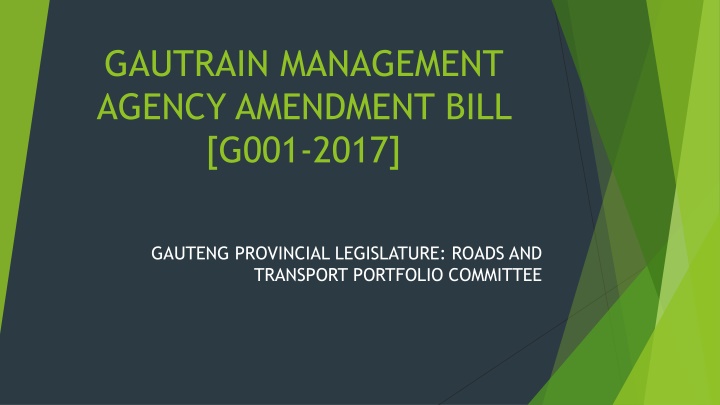

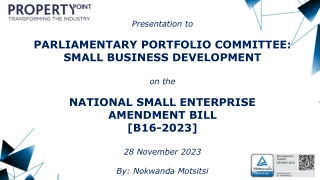
![RE: ELECTORAL MATTERS AMENDMENT BILL [ B42-2023]](/thumb/18837/re-electoral-matters-amendment-bill-b42-2023.jpg)

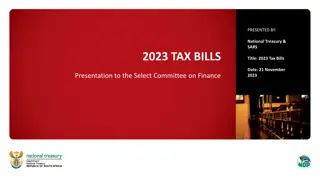
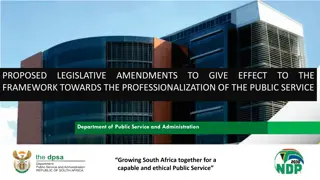


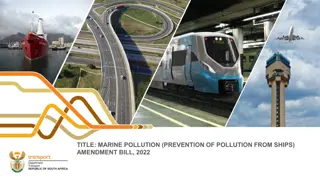
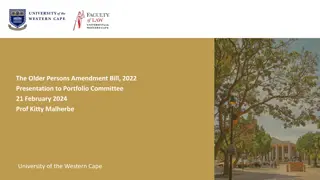
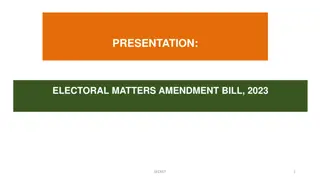


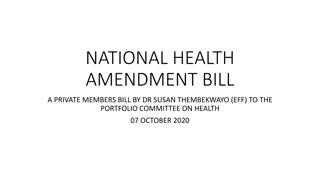

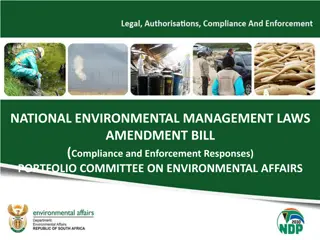

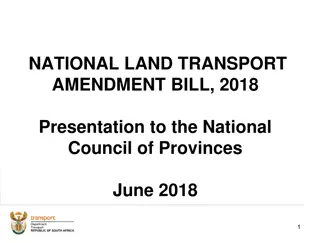
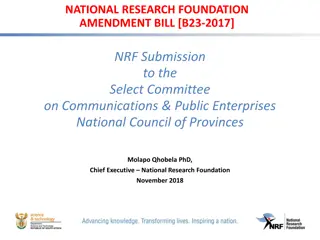

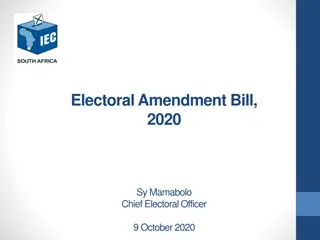

![Briefing on the Criminal Procedure Amendment Bill [B12-2021] to the Portfolio Committee on Justice and Correctional Services](/thumb/157093/briefing-on-the-criminal-procedure-amendment-bill-b12-2021-to-the-portfolio-committee-on-justice-and-correctional-services.jpg)